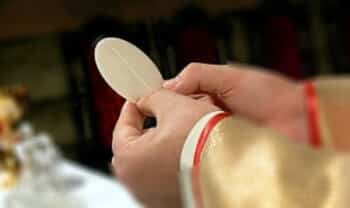
Our first reading is from the book of Exodus which says, “the Lord made Pharaoh obstinate, and he would not let the children of Israel leave his land.” This is in sharp contrast to last Sunday’s Gospel of the Good Samaritan who showed compassion, which is almost the polar opposite emotion. Our associate pastor in his Sunday Homily compared this to how God has compassion for us.
Pharaoh had a hard heart but it did not get him anywhere. Why do any of us today think we can get away with it? One thing I had to do when I read this first reading, was to search my heart for hardness. I had to admit that there were times that I did have that hardness of heart. I was obstinate just like Pharaoh who saw signs and wonders but would not budge. However God gives us the answer to that hardness of heart, through the Pascal Lamb in the Holy Eucharist.
I have been hard of heart only one or two times in my life. On one of those instances. I really did try to please my supervisors but nothing I did seemed to help me to keep my job. My fellow employees seem to be think that I did a good job, and I liked working there. However, my supervisors did not. It seemed like their minds were already made up. I tried to please them but nothing I did helped. I put it behind me, but I still harbored resentment toward what I thought was ill treatment.
A few years later I heard the fate of some of my bosses. Two of them traded wives and had open affairs. They divorced each other and remarried the other’s wife. The most senior of the men had a massive heart attack at the age of 45, and died about a year after his remarriage. The story reads more like a soap opera. I was happy at his ill fate but I was so wrong. I should have been more interested in the state of his soul and prayed for him. Hate made my heart cold and it took years for me to repent and recognize my error. God is not pleased with the death of anyone [Ezekiel 18:32]
God showed me years later, that this was the best thing that could have ever happened to me. My parents were getting older and I moved back to Florida. It turned out that this was the best thing that could have happened for my family and me. They needed me and I was there for them. God did it again. He turned lemons and an obstinate heart into lemonade.
With Pharaoh, God provided the Pascal lamb and the promise of a Savior. “This day shall be a memorial feast for you, which all your generation shall celebrate with pilgrimage to the LORD, as a perpetual institution.” We celebrate this at Mass everyday. The hard heart turned a bad emotion into the compassionate gift of the Blessed Sacrament.
Pharaoh gives us an example of what not to do. Being human we can always fall into a trap. The thing to remember is that is the wrong path is easy to take, but it gets us nowhere. Whenever we choose that emotion of a hard heart, we need to stop and look at God’s compassion for us . I know some people who although good in many ways, harbor some hardness to others. Use the gift of the Eucharist to soften your heart. Hardness of heart is baggage that none of us need to carry.
I leave with the words of the psalmist
Psalm 19: 10-13: “The fear of the LORD is pure, enduring forever. The statutes of the LORD are true, all of them just; More desirable than gold, than a hoard of purest gold. Sweeter also than honey or drippings from the comb. By them your servant is warned; obeying them brings much reward.Who can detect trespasses?
Cleanse me from my inadvertent sins.
If you get a moment please pray for healing for Paul in Ireland and John in Florida who have health issues
God Bless
Bob Burford
